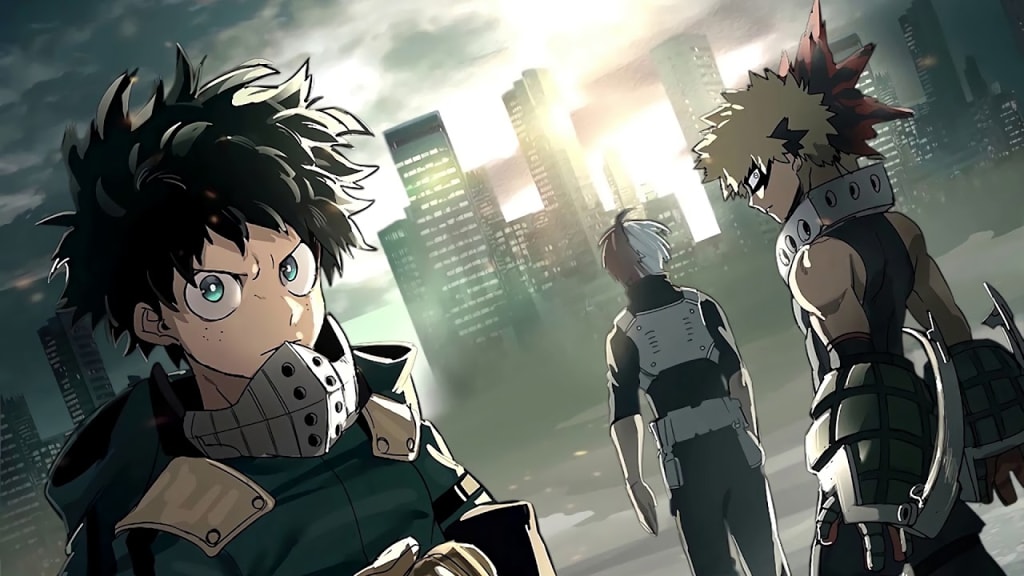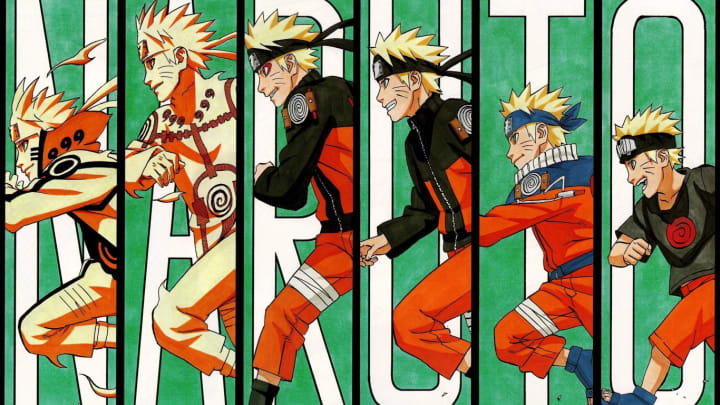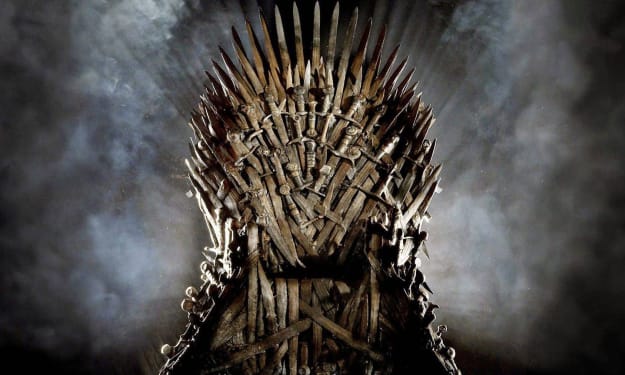Why 'My Hero Academia' Scares Me
The franchise scares me because of what it's not.

I think we can all agree on the fact that superheroes and the superhero genre is the most marketable form of entertainment in the world right now. We've got movies which, when combined together, weave cinematic universes, which spawn numerous spin-off series (TV shows and movies alike), which in turn give rise to video games and toys, among other forms of merchandise. As of late, however, the trend has gone on to dominate another emerging form of entertainment. I am of course, talking about anime, and the amazing series that is My Hero Academia.
My Hero Academia (or Boku no Hero Academia) premiered in 2016 to amazingly positive reviews from critics and fans alike. The show was praised for its story, animation, and extremely likeable characters, despite the premise of the show being fairly simple and most of its pivotal moments being heavily reminiscent of previous shōnen manga that came before it. However, in a surprising twist, the typical tropes that frequent anime viewers are so familiar with are done so well in this show that more often than not, it feels like they're completely new. This is great for the genre, as it shows that even dated concepts can be presented in fun and unique ways as long as there's a degree of creativity in how its told.
Which, unfortunately, brings me to my concern for the show.
Now don't get me wrong: I absolutely love My Hero Academia. I watched both seasons in a matter of weeks and I'm anxiously awaiting the third season, which is premiering in April of next year. I think it's one of the best anime going around right now, and I, in no way wish to demean it. These observations simply show, in my opinion, what is so great about this show, and thus, why I'm scared for its future in today's rapidly changing anime industry.
1. Maintaining Relevancy

Attack on Titan and My Hero Academia
In 2013, Attack on Titan made such a colossal impact to how anime was perceived outside Japan that it impacted the sudden spurt of anime in Western culture today. The reverberations caused by the series could be felt throughout the anime world, with the hype reaching heights that at the time, had only been seen by the much acclaimed "Big Three" of anime (Naruto, Bleach, and One Piece). As the first season wrapped up, fans were super excited for the second season of the show, which was supposed to air in 2014 or 2015 at the latest... only for it to be postponed to 2017.
Not only did this huge delay turn people away from the show, since the manga had moved so far ahead with its story, most people who got sick of waiting for the anime to release switched to the manga instead, and got more invested in that story. So even when the anime eventually came back around, not too many people were interested simply because the manga was so much more interesting. MHA seems to have avoided this problem by keeping one season on air per year, a move which is sure to yield a world of benefit as it gives the studio more than enough time to animate and pace the plot to make sense with the position of the anime. This not only maintains interest in the show, but it also has the potential to bring in new audiences every time a season is about to be shown. Another quirk, perhaps the most important of all, is that it gives the manga enough time to advance the story, so that the studio and production team has no fear of catching up to the story in the manga.
2. Story Arcs

The Cast of Dragon Ball Z During Its Majin Buu Saga
Of course, when we love a movie or a TV show, we want to see more of it and elongate its stay in our lives. Unfortunately, this can get a bit tedious, and the item in question tends to outstay its welcome fairly quickly. I can't think of a more perfect example for this offence than the grand daddy of shōnen, Dragon Ball Z. The show's fifth major story arc, the infamous Majin Buu saga, goes on for a staggering 80 episodes, give or take; and a lot of the content in these episodes could easily be considered as filler. It's a typical problem that's seen in many shōnen anime, one that is done even today (the ongoing "Universe Survival" or "Tournament of Power" arc in Dragon Ball Super comes to mind). The problem with such long arcs is that most of the time, a lot of the elements we see as the audience are nothing more than additional padding just shoved in to prolong the story. It always felt like an excuse to usher in new transformations and power ups, which was and still is a staple of shōnen anime.
What MHA has done different is that it has kept all its story arcs crisp and concise. One season is twenty episodes (on an average—the first season was thirteen and the second was twenty-five) and the major story arcs don't last more than five to seven episodes. Of course, the challenge here is to make the arc short yet interesting, and with MHA's second season having both an outstanding tournament arc (one of the best ever seen in anime) and an engrossing "Hero Killer" arc to follow it, the show has succeeded in keeping things interesting, while also progressing the plot with new challenges for the heroes to fight and overcome, be them in the form of villains or personal challenges. While this means that problems will get resolved or that arcs will end just as quick as they come, MHA has (so far) resolved the arcs in satisfying ways that don't leave too many unanswered questions—just enough for you to keep watching to find out what the overarching story is going to be next.
3. Losing Sight of What it Is

Naruto Uzumaki Through the Ages
Like most anime fans, I grew up on two of the biggest shōnen anime that have ever released—Naruto and Dragon Ball Z. Naruto in particular was the anime that captivated me more because of its complex characters and interesting world that kept expanding with each arc. When the show first started airing around the world, it was pretty clear what the show was about—a kid trying to become stronger and grow as a ninja. For the most part, this was the motif for the first series. However, when the second series, Naruto Shippuden started, it slowly deviated from being about Naruto's journey and more to a war between nations of the world. This was unexpected, but not bad in the least due to how well the characters had been developed and the possibilties that could be used to put them in very challenging situations.
However, I did have a problem when the series turned into Dragon Ball Z.

Did someone order a giant meteor?
Giant meteors being hurled from the sky? Enormous balls energy being fired from one person only to be countered by another equally massive ball of energy? Planet busting attacks delivered by people who are basically gods? What happened to the strategic, action packed show that I started watching before this?
By the end of Naruto's lifespan in the anime world, the series was completely unrecognisable compared to how it started out. A large portion of this has to do with the escalation problem that many shōnen anime are privy to, which basically introduces stronger characters season after season until you're basically having gods fight other gods. The show lost all semblance of strategy and subtlety which were two factors that made Naruto one of the best shonen anime out there. This is why I felt that it didn't feel like the same anime in the final stages of its life. It felt like something different, both visually and tonally. The last fight of the series redeemed it in some ways but it still put me off the more I thought about it after watching the episodes. MHA seems to have avoided this problem for now by showing us the pinnacle of power in the world they live in right from the get go while also giving us a very clear picture on what the goal of the main character is. They have also consistently shown us that it takes more than strength to win a fight, which fits with the image of heroes they're trying to show us. There's strategy, mitigating circumstances, innocent lives, etc. that all have to be accounted for when fighting villains, and sometimes you have to lose the battle in order to win the war.
So far, nothing about MHA has any of the flaws that previous shōnen manga have had in the recent years, but that's exactly what has me worried.
My Hero Academia is a brilliant series. It's brought life back to shonen anime after years of mediocrity with a by and large standard idea but executed in such a different way that you can't help but like it. It's funny, creative, and refreshing. I don't want to remember this series as the one that "almost" changed the trend of shōnen anime being long-winded shows that span decades only to come to a half-realised conclusion after being changed completely. I want this to be the show that changes things for the better, for both shōnen and the anime world in general.
Not too much to ask, is it?
About the Creator
Arvind Pennathur
I'm a graduate law student with a love for the quieter things in life. I write on a variety of topics, along with the occasional short story or poem. My perfect evening? Give me a rainy day, a cup of coffee, and a place to sit and write.






Comments
There are no comments for this story
Be the first to respond and start the conversation.